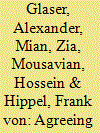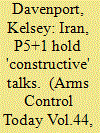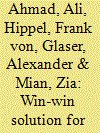|
|
|
Sort Order |
|
|
|
Items / Page
|
|
|
|
|
|
|
| Srl | Item |
| 1 |
ID:
132781


|
|
|
|
|
| Publication |
2014.
|
| Summary/Abstract |
Iran is negotiating with a group of six states over the future of its nuclear program. In November 2013, Iran and the P5+1 (China, France, Germany, Russia, the United Kingdom, and the United States) agreed to a Joint Plan of Action that seeks to reach a "comprehensive solution" by July 20, 2014.
The goal is an agreement on a set of measures that can provide reasonable assurance that Iran's nuclear program will be used only for peaceful purposes and enable the lifting of international sanctions imposed on Iran over the past decade because of proliferation concerns.
A key challenge is to reach agreement on limiting Iran's uranium-enrichment program, which is based on gas centrifuges, in a way that would enable Iran to meet what it sees as its future needs for low-enriched uranium (LEU) fuel for nuclear research and power reactors while forestalling the possibility that this program could be adapted to quickly produce highly enriched uranium at levels and in amounts suitable for use in nuclear weapons
|
|
|
|
|
|
|
|
|
|
|
|
|
|
|
|
| 2 |
ID:
130360


|
|
|
|
|
| Publication |
2014.
|
| Summary/Abstract |
Iran and six world powers held "constructive and useful" talks on a comprehensive deal on Iran's nuclear program, according to a March 19 joint statement released by the parties. A main topic of the talks between Iran and the six-country group, known as the P5+1 (China, France, Germany, Russia, the United Kingdom, and the United States), was Iran's uranium-enrichment program. The March 17-19 talks in Vienna were the second set of meetings between Iran and the P5+1 on a comprehensive deal on Iran's nuclear program after the parties reached an interim agreement in November. Implementation of the initial actions began Jan. 20 and is to last six months. If an agreement is not reached, the interim deal can be extended by mutual consent of the two sides. U.S. officials have said they hope to reach a final deal within the first six months. Iran maintains that its nuclear program is for peaceful purposes, but some countries are concerned that Iran could use its nuclear capabilities to develop nuclear weapons.
|
|
|
|
|
|
|
|
|
|
|
|
|
|
|
|
| 3 |
ID:
130326


|
|
|
|
|
| Publication |
2014.
|
| Summary/Abstract |
In November 2013, Iran and the P5+1 group of countries (China, France, Germany, Russia, the United Kingdom, and the United States) agreed on a six-month Joint Plan of Action to enable negotiations on a final settlement to contain the proliferation risks from Iran's nuclear program. This interim agreement freezes Iran's enrichment capacity, thereby preventing a further shortening of the time Iran would require to produce weapons quantities of highly enriched uranium (HEU) if it wished.1 This enrichment capacity has expanded greatly over the years since it first came to international attention in 2002. Iran and the P5+1 also have agreed on the need to constrain Iran's option to produce plutonium for weapons using the reactor that is under construction near the city of Arak and that will be under International Atomic Energy Agency (IAEA) safeguards. Under the Joint Plan of Action, Iran has agreed to freeze the Arak reactor project for six months.2 It also has committed not to separate plutonium from spent nuclear fuel or construct a facility capable of doing so. These are important interim commitments. According to Ali Akbar Salehi, the head of the Atomic Energy Organization of Iran, the Arak reactor is intended for radioisotope production and testing of nuclear fuel and materials. In response to the P5+1 proposal that Iran scrap the Arak reactor project, Salehi stated that "we see no point stopping the work on this reactor." He has acknowledged, however, the international community's concerns about the Arak reactor and offered the possibility of design changes "in order to produce less plutonium in this reactor and in this way allay the worries and mitigate the concerns.
|
|
|
|
|
|
|
|
|
|
|
|
|
|
|
|
|
|
|
|
|